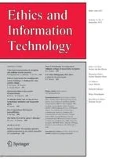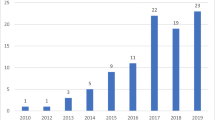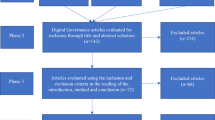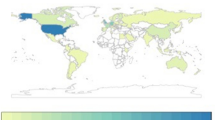Abstract
Information technologies (IT) play a criticalrole in transforming public administration andredefining the role of bureaucracy in ademocratic society. New applications of ITbring great promises for government, but at thesame time raise concerns about administrativepower and its abuse. Using GeographicInformation Systems (GIS) as the centralexample, this paper provides the philosophicalunderpinnings of the role of technology anddiscusses the importance of an ethicaldiscourse in IT for public serviceprofessionals. Such ethical discourse must bebased on upholding the democratic values andpreserving the institutional integrity of ITprofessionals in public office.
Similar content being viewed by others
References
Robert Barr. Nowhere to Hide. Geographical Magazine, 69(4): 30, 1997.
Doug Brown. Report: Federal Government Is Digital Disaster. Interactive Week, Vol. 7, Issue 12, p. 94, March 27, 2000.
Maureen M. Brown and Jeffrey L. Brudney. A 'Smarter, Better, Faster, and Cheaper' Government: Contracting and Geographic Information Systems. PAR, 58(4): 335–346, 1998.
Maureen M. Brown, Jeffrey Brudney, William Waugh and Ronald Hy. Graduate Education in Information Technology in the Public Sector: The Need and the Response. In G. David Garson, editor, Handbook of Public Information Systems, Marcel Dekker Inc., New York, 2000.
R.C. Chandler. A Guide to Ethics for Public Servants. In J.L. Perry, editor, Handbook of Public Administration, pp. 602–618. Jossey-Bass, San Francisco, CA, 1989.
M.J. Clark. GIS-Democracy or Delusion. Environment and Planning A, 30(2): 303–317, February 1998.
Computer World. IT and Top Corporate Security Threats. Vol. 34, Issue 18, p. 63, 2000.
Christina Couret, Mary Wagner and Sheila Smith. Census 2000: Counting on GIS to Assist U.S. Census Bureau in Survey Activities, Cities and Counties have Incorporated GIS Technology to Conduct Their Own Population Counts and to Support Their Data. American City and County, 113(11): 38–49, 1998.
Michael R. Curry. Geographic Information Systems and the Inevitability of Ethical Inconsistency. In John Pickles, editor, Ground Truth: The Social Implications of Geographic Information Systems. Guilford Press, New York, 1995.
J. Danziger and Kim Andersen. The Impact of Information Technology on Public Administration: An Analysis of Empirical Research from the 'Golden Age' of Transformation. International Journal of Public Administration, 25(5): 591–608, 2002.
William H. Dutton. Society on the Line: Information Politics in the Digital Age. Oxford University Press, Oxford, UK/New York, 1999.
Esnard, Ann-Margaret. Cities, GIS and Ethics. Journal of Urban Technology, 5(3): 33–45, 1998.
Federal Geographic Data Committee (FGDC). FGDC metadata [On-line], 1999. http://www.fgdc.gov/metadeta.html.
Fischer Frank. Technocracy and the Politics of Expertise. Sage, Newbury Park, CA, 1990.
J. Kenneth Galbraith. The New Industrial State. Houghton Mifflin, Boston, 1967.
N. Garnham. What Ever Happened to the Information Society? In Management of Information and Communication Technologies: Emerging Patterns of Control, pp. 42–51. Aslib, London, 1994.
General Accounting Office (GAO). 10 a.m. High-Risk Areas: Actions Needed to Solve Pressing Management Problems. Government Printing Office, Washington, D.C., 1997 (GAO/T-AIMD/GGD–97–60).
Michael Goodchild. Geographic Information Systems and Geographic Research. In John Pickles, editor, Ground Truth: The Social Implications of Geographic Information Systems. Guilford Press, New York, NY, 1995.
A. Gore. From Red Tape to Results: Creating a Government that Works Better and Costs Less. Random House, New York, 1993.
Grace Commission. President's Private Sector Survey on Cost Control: Report on Automated Data Processing and Office Automation, Approved by the Subcommittee for the Full Executive Committee, Spring-Fall, 1983.
J. Habermas. Toward a Rational Society: Student Protest, Science, and Politics. J.J. Shapiro, Trans. Beacon Press, Boston, 1970.
Barry N. Hague and Brian Loader. Digital Democracy: Discourse and Decision Making in the Information Age. Routledge, London/New York, 1999.
Akhlaque Haque. GIS, Public Service and the Issue of Democratic Governance. Public Administration Review, 61(3): 259–265, May/June 2001.
Martin Heidegger. The Question Concerning Technology. Harper Colophon, New York, 1977.
P. Hernon and R. Duggan. GIS and Privacy. Journal of Academic Librarianship, 23(6): 515–517, 1997.
L. Hoffman. More Cities Utilizing Technology. Government Technology 11: 6, 1998.
Eric W. Howard. New Technology and Organizational Change in Local Authorities. Computers, Environment and Urban Systems, 10(1): 9–18, 1985.
R.W. Lake. Planning and Applied Geography: Positivism, Ethics and Geographic Information Systems. Progress in Human Geography, 17: 404–413, 1993.
C.W. Lewis. The Ethics Challenge in Public Service: A Problem Solving Guide. Jossey-Bass, San Francisco, CA, 1991.
Charles E. Lindblom and D. Cohen. Usable Knowledge: Social Science and Social Problem Solving. Yale University Press, New Haven, CT, 1979.
D.J. Maguire, M.F. Goodchild and D.W. Rhind, editors. Geographical Information Systems: Principles and Applications. Wiley, New York, 1991.
D. Martin. Geographic Information Systems and their Socioeconomic Applications. Andover, Hants, England, Routledge, Capman and Hall, 1991.
Ian Masser. Governments and Geographic Information. Taylor & Francis Inc, Bristol, PA, 1998.
Gary Moll, Municipalities More than Double GIS Use. Civil Engineering, 69(6): 65, 1999.
M. Monmonier. How to Lie with Maps, 2nd edn. University of Chicago Press, Chicago, 1996.
Zorica Nedovic-Budic and David Godschalk. Human Factors in Adoption of Geographic Information Systems: A Local Government Case Study. PAR, 56(6), 554–568, 1996.
J. O'Looney. Beyond Maps: GIS and Decision Making in Local Government. ICMA, Washington, D.C., 1997.
H.J. Onsrud. Identifying Unethical Conduct in the Use of GIS. Cartography and Geographic Information Systems, 22(1): 90–97, 1995.
J. Pickles, editor. Ground Truth: The Social Implications of Geographic Information Systems. Guilford Press, New York, 1995.
PITAC. President's Information Technology Advisory Committee. Interim Report to the President. National Coordination Office for Computing, Information and Communications, Arlington, VA, 1998.
Aatto Repo. The Value of Information-Approaches in Economics, Accounting, and Management Science. Journal of American Society for Information Science, 40(2): 68–65, 1989.
John A. Rohr. Ethics for Bureaucrats. Marcel Dekker, New York, 1978.
L. Sugarbaker. A Corporate Perspective for Treating Data as an Asset. Legal Issues and GIS. Am Productions Inc., Vancouver, BC, 1991.
J. Taylor. Informatization as X-ray: What is Public Administration for the Information Age? In I. Snellen and H.J. van de Donk, editors, Public Administration in an Information Age: A Handbook, pp. 21–31, 1998.
P.J. Taylor. GIS-A Comment. Political Geography Quarterly, 9(3): 211–212, 1990.
Dennis F. Thompson. Bureaucracy and Democracy. In G. Duncan, editor, Democratic Theory and Practice, pp. 235–250. Cambridge University Press, New York, 1983.
Snellen I.M. Van de Donk and P.W. Tops. Orwell in Athens: A Perspective on Informatization and Democracy. IOS Press, Netherlands, 1995.
Stephen J. Ventura. The Use of Geographic Information Systems in Local Government. PAR, 55(5): 461–467, 1995.
A. Welch. The Technocracy Behind Politics: Increasing use of Geographic Information Systems in Determining Voter Behavior. Insight on the News, Vol. 17(8), p. 19, February 26, 2001.
A. Zuurmond. From Bureaucracy to Infocracy: A Tale of Two Cities. Information Infrastructure and Policy, 3(4): 189–204, 1994.
Rights and permissions
About this article
Cite this article
Haque, A. Information technology, GIS and democraticvalues: Ethical implications for ITprofessionals in public service. Ethics and Information Technology 5, 39–48 (2003). https://doi.org/10.1023/A:1024986003350
Issue Date:
DOI: https://doi.org/10.1023/A:1024986003350




